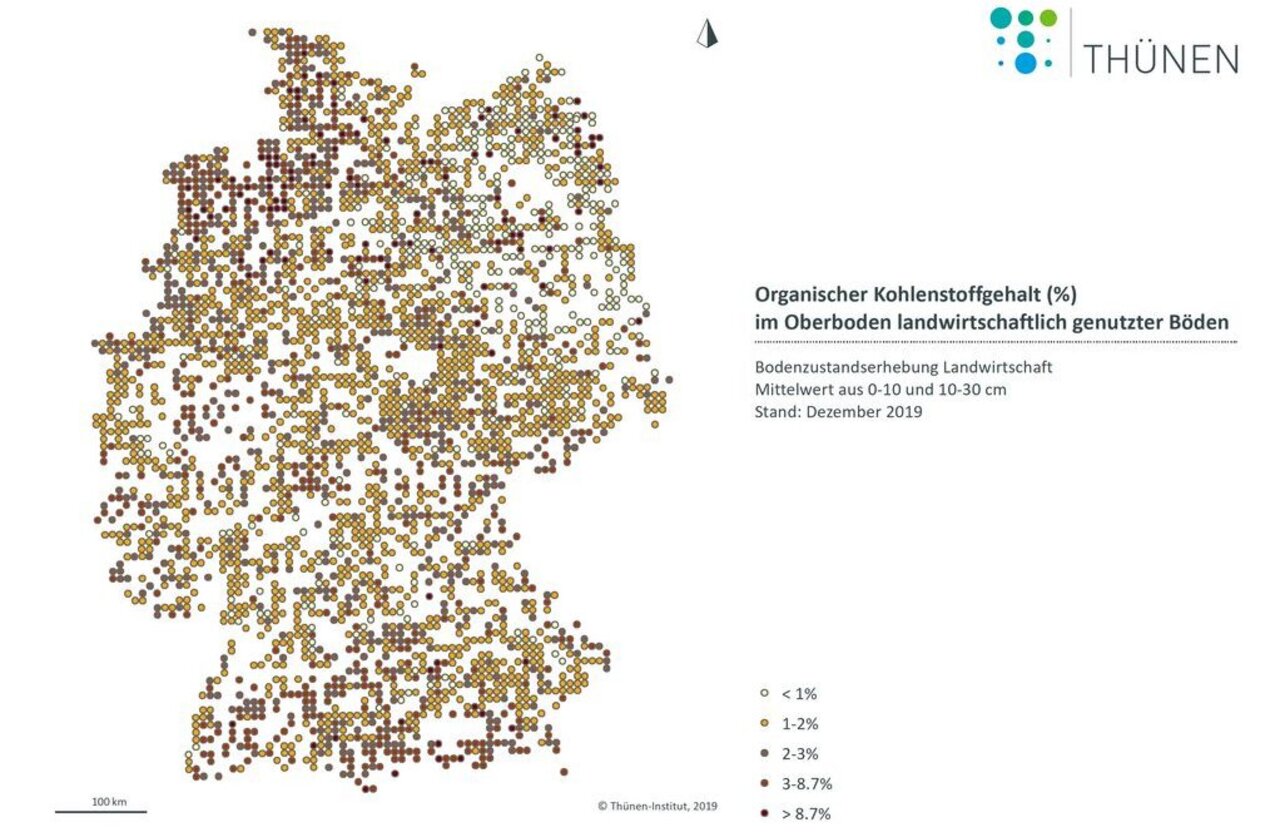Project
Soil carbon modeling

Modeling of soil organic carbon stock changes in agricultural soils
The German Agricultural Soil Inventory provides data on the current status of soil organic carbon stocks. With process oriented modelling the dynamic development of soil carbon stocks under agricultural land-use shall be estimated is order to determine which soils sequester or loose soil organic carbon.
Background and Objective
Modelling of soil organic carbon dynamics on reginal to national scale is challenging due to the high spatial variability of drivers such as soil properties, climate and land management. Many different models have been developed during the last decades that estimate soil organic carbon dynamics. In a systematic assessment models will be selected and validated that best fit to pedo-climatic conditions of German agricultural soils. In order to run the models the C input with biomass from crop residues and roots have to be estimated as input variable for the model. There are different allocation functions available which are also tested and selected. The aim of the project is to develop a model ensemble that is able to estimate current and future soil carbon dynamics at national scale und to predict soil carbon under different management scenarios.
Approach
In order to select and validate soil carbon models, data from the German long-term monitoring network are used as well as data from long-term field experiments. In total six commonly used soil carbon models and five different allocation functions to estimate the C input to the soil are used in a comparative study. This will result in a model ensemble which will be used to estimate for all 3100 sampling points of the Soil inventory Agriculture if soils are source or sink for CO2.
Thünen-Contact

Involved Thünen-Partners
Duration
7.2015 - 10.2019
More Information
Project status:
finished
Publications
- 0
Riggers C, Poeplau C, Don A, Frühauf C, Dechow R (2021) How much carbon input is required to preserve or increase projected soil organic carbon stocks in German croplands under climate change? Plant Soil 460:417-433, DOI:10.1007/s11104-020-04806-8
- 1
Flessa H, Don A, Jacobs A, Dechow R, Tiemeyer B, Poeplau C (2019) Humus in landwirtschaftlich genutzten Böden Deutschlands : Ausgewählte Ergebnisse der Bodenzustandserhebung. Berlin: BMEL, 47 p
- 2
Riggers C, Poeplau C, Don A, Bamminger C, Höper H, Dechow R (2019) Multi-model ensemble improved the prediction of trends in soil organic carbon stocks in German croplands. Geoderma 345:17-30, DOI:10.1016/j.geoderma.2019.03.014
- 3
Jacobs A, Flessa H, Don A, Heidkamp A, Prietz R, Dechow R, Gensior A, Poeplau C, Riggers C, Schneider F, Tiemeyer B, Vos C, Wittnebel M, Müller T, Säurich A, Fahrion-Nitschke A, Gebbert S, Jaconi A, Kolata H, Laggner A, et al (2018) Landwirtschaftlich genutzte Böden in Deutschland - Ergebnisse der Bodenzustandserhebung. Braunschweig: Johann Heinrich von Thünen-Institut, 316 p, Thünen Rep 64, DOI:10.3220/REP1542818391000

![[Translate to English:] [Translate to English:]](/media/_processed_/6/4/csm_titel_CO2Kampagne8_afeea2273e.png)
![[Translate to English:] [Translate to English:]](/media/_processed_/4/1/csm_titel_93px_CO2Kampagne8_9b0f3354d4.png)




